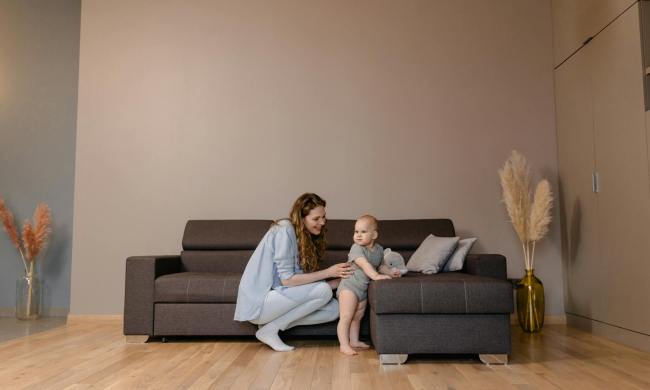
Have you found yourself wondering where your newborn baby’s user manual is? Every new noise or behavior can cause new parents to rush and search the internet for answers. It may seem like every time you figure this new baby out, she throws you a curveball.
Keeping your baby happy and healthy may seem daunting, but there are clear signs of a healthy baby.
What are the signs of a healthy baby?
1. Signs of bonding
Scientists are studying the importance of strong bonds between parents and their babies. These attachments are essential to newborn development. Mary Beth Steinfeld, M.D. asserts “When a caregiver consistently responds to an infant’s needs, a trusting relationship and lifelong attachment develops.”
Bonding with your baby doesn’t only deepen your relationship; it also helps her experience social and emotional growth. Steinfeld explains bonding “sets the stage for the growing child to enter healthy relationships with other people throughout life and to appropriately experience and express a full range of emotions.”
You may feel that strong pull towards your brand new baby while staring at her fingers and toes, but how do you know if your baby reciprocates those feelings? Alison Gopnik, Ph.D., a psychology professor at the University of California, Berkeley and the author of The Philosophical Baby, explains “within a few weeks, babies can recognize their caregiver and they prefer her to other people.”
Babies show attachment to their caregivers in many ways. They may stare intently at loved ones, calm when they hear familiar voices or are picked up by their parents, and eventually will start smiling when she sees loved ones.
2. Attentive to sights and sounds
According to the American Optometric Association, babies aren’t born with 20/20 vision and your infant will need to learn to see. Much like learning to hold her head up for longer stretches, training the eyes can take time.
By two months, your baby’s eyes will begin focusing better and she may be able to recognize your face and facial expressions. At three months, your baby should be able to visually focus on objects and even track them while moving around.
Although your baby could hear your voice while in your womb, it takes some time for your newborn to adjust to how different the world sounds outside your belly. Around month two or three, your baby should start turning her head towards sudden, loud noises and to new or exciting sounds.
3. Frequent diaper changes
After your baby shower you may have stared at all those diapers thinking there was no possible way you would make it through that many. Now, you may be wondering if something is wrong with your newborn.
At your baby’s check-up, your pediatrician will ask how many wet and soiled diapers your baby has on the average day. Typically, newborns should have at least six wet diapers during their first month and at least one poopy diaper a day.
Although diaper amounts can fluctuate between formula-fed and breastfed babies, most pediatricians hope to see 8 to 10 dirty diapers a day. This usually means your baby is receiving enough milk to stay hydrated and to support infant development.
4. Settling into a routine
Your first month with baby can seem like an endless blur of feedings, diaper changes, and sporadic sleeping. As you and your baby get familiar with each other, you should fall into a good routine. In fact, developing and maintaining a routine means your baby is healthy.
Usually, by month four, your baby should be sleeping for more consistent stretches and eating at regular intervals. These schedules may get disrupted by teething and other developmental stages, but overall you should have more consistent days than not as your infant grows.

How do I know if my baby is growing well?
At each pediatrician appointment, your baby’s doctor will measure her heat, height, and weight. These measurements will track her specific growth patterns and can be used to determine how your baby is growing.
Your pediatrician will discuss any concerns about your baby’s growth and provide suggestions. It’s important to remember every child develops in their own way and you may need to factor in how active your child is and family growth patterns.
How do I know if something is wrong with my baby?
Babies change so much in their first year. Just as you begin to feel like you have a handle on your baby’s cues, she may change. This can cause new parents to worry. If you ever have any concerns, you should contact your pediatrician.
If your baby experiences any of the following, consult her doctor:
- A sharp decrease or lack of wet diapers
- No bowel movements in over 48 hours
- Decreased appetite
- Symptoms of illness (fever, cough, diarrhea, congestion)
- Yellowing skin
- Increased irritability or crying that doesn’t get better when comforted



